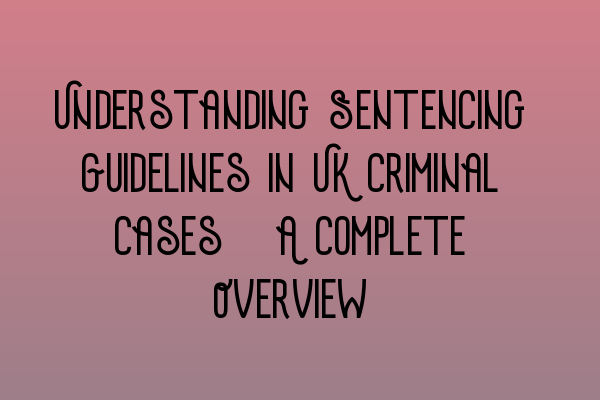Understanding Sentencing Guidelines in UK Criminal Cases: A Complete Overview
As criminal solicitors at SQE Criminal Law & Practice Law UK, we understand the complexities and nuances of the UK criminal justice system. One crucial aspect that plays a significant role in criminal cases is sentencing guidelines. In this comprehensive guide, we will provide you with a detailed understanding of the sentencing guidelines in the UK and their impact on criminal cases.
What Are Sentencing Guidelines?
Sentencing guidelines are a set of rules and principles developed by the Sentencing Council for England and Wales. These guidelines aim to ensure consistency and fairness in sentencing by providing a framework for judges and magistrates to determine appropriate punishments for different criminal offenses.
Before discussing the specifics of sentencing guidelines, it is essential to understand the factors that influence sentencing decisions:
- The seriousness of the offense
- The culpability of the offender
- The impact on the victim
- The presence of any aggravating or mitigating factors
Types of Offenses and Sentencing Guidelines
In the UK, criminal offenses are categorized into different levels of severity. Each category has its corresponding range of sentences defined by the guidelines. The four main types of offenses are:
- Summary Offenses: These are minor offenses typically heard in the Magistrates’ Court. The maximum sentence for summary offenses is usually six months’ imprisonment.
- Either Way Offenses: These offenses can be heard in either the Magistrates’ Court or the Crown Court, depending on their severity. The sentencing guidelines provide a range of sentences for each offense, depending on its seriousness.
- Indictable Only Offenses: These are the most serious offenses that can only be heard in the Crown Court. The guidelines provide a range of sentences for each offense.
- Mandatory Life Sentencing Offenses: Certain offenses, such as murder, carry a mandatory life sentence. However, the guidelines outline the minimum term that must be served before parole can be considered.
It’s important to note that while the guidelines provide a recommended range of sentences, judges and magistrates still have discretion in sentencing to consider the specific circumstances of each case.
Factors Considered in Sentencing
When determining an appropriate sentence within the recommended range, the following factors are considered:
- Aggravating Factors: These are factors that increase the severity of the offense, such as premeditation or targeting vulnerable victims.
- Mitigating Factors: These are factors that reduce the severity of the offense, such as remorse or lack of previous convictions.
- Guilty Pleas: A guilty plea at an early stage may result in a reduced sentence as it demonstrates remorse and saves the court’s time.
- Previous Convictions: The offender’s previous criminal record is taken into account when determining an appropriate sentence.
- Victim Impact Statements: Victim impact statements provide the court with information about the emotional, physical, and financial impact of the offense on the victim and can influence the sentencing decision.
Sentencing guidelines are regularly updated to ensure they reflect changes in society and maintain consistency in sentencing. It is crucial to stay up-to-date with the latest guidelines relevant to your case to effectively advocate for your clients.
If you are preparing for the SQE 1 or SQE 2 exams, we also offer SQE 1 Practice Exam Questions and SQE 1 Practice Mocks FLK1 FLK2 to help you succeed. We provide comprehensive preparation courses for both the SQE 1 and SQE 2 exams. Check out our SQE 2 Preparation Courses and SQE 1 Preparation Courses to boost your chances of passing the exams. Don’t miss the important SRA SQE Exam Dates to plan your study schedule effectively.
If you have any questions about sentencing guidelines or need legal assistance with a criminal case, our expert solicitors at SQE Criminal Law & Practice Law UK are here to help. Contact us today for a consultation.
